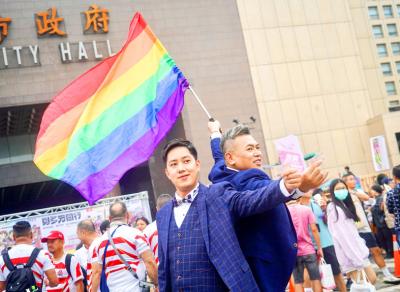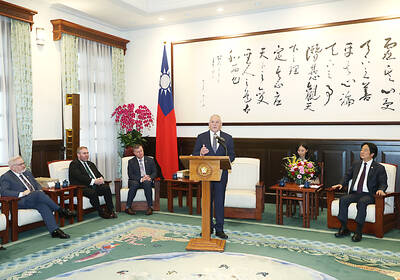The Taiwanese community in Australia is joining the Sydney Gay and Lesbian Mardi Gras for the first time as “Taiwan,” showcasing Taiwanese culture with custom T-shirts, banners, music and dance.
The Sydney Gay and Lesbian Mardi Gras, which was started in 1978 as a protest advocating for LGBTQ+ rights, is one of the world’s most iconic pride parades, with hundreds of thousands of participants every year. This year’s parade is scheduled for March 1.
Anabelle Chen, who is originally from Taiwan and now works for the New South Wales government, came up with the idea to participate in the parade as “Taiwan.”

Photo courtesy of Anabelle Chen via CNA
When Chen’s 10-page plan was approved by the organizer, Taiwan officially became one of 200 participating groups.
Chen and her partner, Noel, cofounded Taiwan Pride Sydney to prepare for the historic event, and they steadily recruited more people with the help of friends and family.
They are using their free time to prepare promotional materials, music and choreography for the parade, and are also reaching out to Taiwanese across Australia via social media, asking for support and inviting them to participate, Chen said.
The group designed custom T-shirts, rainbow lights and other swag for parade-goers, ordered handheld rainbow lights from Taiwan and created custom Taiwanese stickers, showcasing their creativity and attention to detail.
They are preparing a banner that says “Be bold, just be — Taiwan shines free,” as well as Taiwanese, Australian and rainbow flags to fly during the parade.
The group’s participation symbolizes Taiwan and Australia’s mutual support for diversity and equality, Chen said.
This would be the first time for Taiwan to officially participate in the Sydney parade, Chen said.
“It’s my goal to have team Taiwan participate every year, even adding a float to make the team stand out more,” she said.
When the group announced their participation, Taiwanese across Australia quickly expressed support, including many who are planning to fly from Melbourne and even Western Australia to march with them in the parade, while others who are unable to attend donated to support preparations.
Indonesian and Japanese communities in Australia have participated in the parade under their countries’ name before, Chen said.
However, as the first country in Asia to legalize same-sex marriage, Taiwan’s participation bears a special significance, she said.
Joining the parade is only the beginning, she said, adding that they would continue to work to increase the visibility of queer Taiwanese living in Australia and promote more exchanges between the two nations.
Australia legalized same-sex marriage in December 2017, becoming the 26th country in the world to do so.

Taipei on Thursday held urban resilience air raid drills, with residents in one of the exercises’ three “key verification zones” reporting little to no difference compared with previous years, despite government pledges of stricter enforcement. Formerly known as the Wanan exercise, the air raid drills, which concluded yesterday, are now part of the “Urban Resilience Exercise,” which also incorporates the Minan disaster prevention and rescue exercise. In Taipei, the designated key verification zones — where the government said more stringent measures would be enforced — were Songshan (松山), Zhongshan (中山) and Zhongzheng (中正) districts. Air raid sirens sounded at 1:30pm, signaling the

The number of people who reported a same-sex spouse on their income tax increased 1.5-fold from 2020 to 2023, while the overall proportion of taxpayers reporting a spouse decreased by 4.4 percent from 2014 to 2023, Ministry of Finance data showed yesterday. The number of people reporting a spouse on their income tax trended upward from 2014 to 2019, the Department of Statistics said. However, the number decreased in 2020 and 2021, likely due to a drop in marriages during the COVID-19 pandemic and the income of some households falling below the taxable threshold, it said. The number of spousal tax filings rebounded

A saleswoman, surnamed Chen (陳), earlier this month was handed an 18-month prison term for embezzling more than 2,000 pairs of shoes while working at a department store in Tainan. The Tainan District Court convicted Chen of embezzlement in a ruling on July 7, sentencing her to prison for illegally profiting NT$7.32 million (US$248,929) at the expense of her employer. Chen was also given the opportunity to reach a financial settlement, but she declined. Chen was responsible for the sales counter of Nike shoes at Tainan’s Shinkong Mitsukoshi Zhongshan branch, where she had been employed since October 2019. She had previously worked

‘NON-RED’: Taiwan and Ireland should work together to foster a values-driven, democratic economic system, leveraging their complementary industries, Lai said President William Lai (賴清德) yesterday expressed hopes for closer ties between Taiwan and Ireland, and that both countries could collaborate to create a values-driven, democracy-centered economic system. He made the remarks while meeting with an Irish cross-party parliamentary delegation visiting Taiwan. The delegation, led by John McGuinness, deputy speaker of the Irish house of representatives, known as the Dail, includes Irish lawmakers Malcolm Byrne, Barry Ward, Ken O’Flynn and Teresa Costello. McGuinness, who chairs the Ireland-Taiwan Parliamentary Friendship Association, is a friend of Taiwan, and under his leadership, the association’s influence has grown over the past few years, Lai said. Ireland is